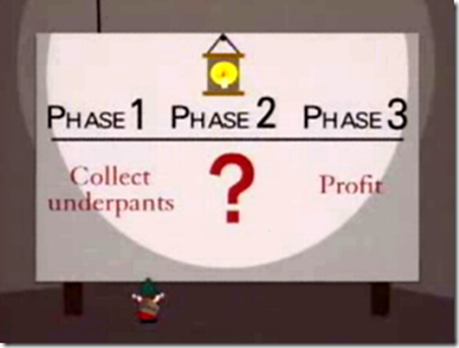Many SEO professionals spend their weekends watching Saturday Night Live (this one included, from time to time!) – but did you know that what you’re seeing put into play week after week can actually make you better at optimizing marketing strategies?

Improvisation, along with other types of performance art, can support creative thinking (and we all know that sometimes we’re challenged to come up with unique solutions to complex problems) amongst other benefits.
Improvisation schools like Second City hosts hundreds of corporate trainings each year for lawyers, C-suite executives, sales professionals, and marketers alike. Research cites that improv can help with understanding of body language, boosting imagination and idea generation, improving comfort levels with risk, and overcoming the fear of being judged.
As SEOs, we’re often put into situations where skills like these can prove invaluable. That meeting with your CEO to justify why you need an SEO strategy to begin with? The client call where you’re hit with a curveball question? The data set you’ve been staring at for days without coming to a solid conclusion? Improv can help.
A couple of years ago, I took an improv class at a local performing arts venue in my city. It was an exercise for me at a time when I was feeling restless. I wanted to try something new and also build my confidence in being able to think on my feet. It was one of the best things I could have done to boost my skills as an online marketer.
Not only did I walk away feeling more comfortable with thinking on my feet, but I also took the lessons and “rules” of improvisation and found that I could apply them professionally. Websites, SEO tactics, and marketing strategies can benefit by being looked at from the lens of improv.
Here were some of my biggest takeaways.
Listening
Have you found yourself thinking ahead in a conversation with a client or with someone on your team? You’re not alone. Most people have a tendency to plan what they’re going to say next without giving full attention to the discussion that’s happening now in the moment.
Improv challenges you to listen to not only your scene partner, but your own contributions to an exercise. Without listening, you can’t keep the audience engaged or the scene moving forward.
As SEOs, our jobs change at an ever constant pace. While we need to think ahead, it’s important to not get lost in thinking so far ahead that we lose sight of what’s working today. Take time to recognize and observe present performance and successes so that you can learn from them.
Be a good listener to customers, clients, and your CEO alike. The feedback they give on what you’re doing can prove invaluable. Their perspectives can keep us grounded in looking at the big picture (and c’mon, we all know how easy it is to get lost in a tool or dashboard). Open your ear and mind to what they’re saying – it can spark the next genius move.

Listening can also play a practical role. Social listening tools can give us greater understanding of the sphere in which we’re enacting our strategies. Stuck on blog post topics? Listening to user stories can spark those creative wheels into turning. Use this fundamental human skill only makes our jobs easier.
Saying, “Yes, And…”
The word “yes” is a powerful one in any setting. It encourages collaboration and acknowledges agreement. In improvisation, participants are encouraged to say “yes, and…”. It means to listen to what others say, accept what it said, and then build upon it.
In an SEO scenario, this can mean being open to learning something new and choosing to put it into action. Every optimization tactic out there is new at some point. Instead of approaching with apprehension, try it and think about ways to continue to build on it. We did this with aplomb with content marketing. We’ve moved so far beyond the days of “Step 1. Write a list post. Step 2. Write clickbait headline. Step 3. Generate a billion hits. Step 4. ??? Step 5. PROFIT!”.

It can also mean accepting the reality of a situation and choosing to move forward from it. Sometimes, what you did didn’t work – and that’s okay. You can keep going, keep testing, and keep pushing your strategy forward. But having the ability to move forward without dwelling is important. It’s how we can continue to improve on what we do. After all, where would we be if we only kept looking at meta tags?
Make Statements
In my idol Tina Fey’s Bossypants, she writes that whatever the problem, it’s important to be part of the solution. A seasoned performer, Fey’s advice is to commit to setting a direction. Don’t just see obstacles – see opportunities. If you’ve ever sat at a conference table as a marketer and were asked, “So, what’s next?” this applies to you.
Don’t be afraid to make a statement on your SEO strategy! Yes, there will always be uncertainties and yes, there is always that fear of failure. But you can’t move forward with ANYTHING until you choose to make a declaration.
Trust in what we know is best practice and be decisive. There’s nothing more frustrating to you and to others in your organization, or a client, than being looked to for advice and guidance and not being able to deliver.
Suspension Of Judgement
Humans like to categorize. We like to reason. We like to judge. Fear of judgement can sway the strategies we may choose to present to stakeholders or even a client. It’s easy to get bogged in analysis paralysis.

In my class, one of the first rules I was taught was, “Don’t deny.” When you deny your scene partner, it makes the exercise go south and you both look bad. It stops progress.
In SEO, judgement can come in several forms. The groups of us who approach new tactics with skepticism? The fear of making a bold recommendation because you’re afraid your client “just won’t get it”? Our human nature, while beautiful and integral to our exploration of how to market more effectively can be, in a word, a real jerk sometimes.
Suspend fear of judgement when pitching a new client an idea on how they can turn around their website performance. Don’t judge others when they propose something that seems out of left field. Be open to looking at your greatest challenges from a perspective you never thought of.
Tell A Story
Storytelling is a critical skill to have as an online marketing. In improvisation, performers tell a story through words, movement, voice, character, and presence. In SEO, we can tell a story through content, architecture, analytics, and UX.
Never lose sight of the importance of storytelling in your marketing. It’s how we can build trust and engagement, both internally and externally. Hell, it’s how we MAKE A BETTER INTERNET. PERIOD.
Want people to care about the content you wrote or the site you built? Want a client to be committed to your strategy, no matter how scary it looks right now? Want your marketing director to understand the roadmap you’ve laid out for the coming year?
Use storytelling to your advantage. Go beyond the PowerPoint. Use data in a compelling way. Don’t get caught in the trap of having an algorithm guide the experiences you design for others. Connect with another human being by being just that: a human being. It’s always worth the effort.
Hand-Picked Related Articles:
5 Things Improv (Of All Things!) Can Teach You About SEO
The post 5 Things Improv (Of All Things!) Can Teach You About SEO appeared first on Search Engine People Blog.
(60)
Report Post






